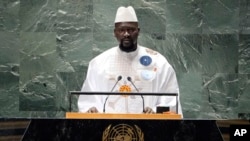The military seized power in the West African country in 2021 and agreed under pressure from regional bloc ECOWAS to organize elections by the end of 2024, after a so-called "transition" period which it said would allow for reforms.
But junta-appointed Prime Minister Amadou Oury Bah has said in recent weeks that the military will not be able to honor this commitment and should remain in power until at least 2025.
Junta chief General Mamady Doumbouya has remained silent on the issue.
"We will firmly oppose any idea of a shift in the transition by all legal means, including demonstrations in the streets and public places throughout the country," said Ibrahima Diallo, a representative from the anti-junta National Front for the Defence of the Constitution (FNDC), which has been dissolved by the authorities.
Guinea is experiencing "a precarious socio-economic situation where electricity is scarce, drinking water is in short supply and unemployment is endemic," he told journalists in the capital Conakry.
"Prolonging the transition amid this socio-political instability is tantamount to prolonging the suffering of the people of Guinea."
Diallo added that the FNDC would hold consultations with parties, civil society groups and press unions with the aim of resuming protests.
He also urged General Doumbouya to resume dialogue with the opposition.
An opposition coalition, the National Alliance for Alternation and Democracy (ANAD), on Saturday urged the junta to organize elections and called for demonstrations.
The FNDC was at the forefront of protests against former president Alpha Conde, who was toppled in 2021, and has organized several days of demonstrations under the junta.
The crackdown on protests in Guinea has left at least 47 people dead, mostly young people, since the military seized power in 2021, Amnesty International said in a report this month.
The junta banned all demonstrations in 2022 and has arrested a number of opposition leaders, as well as members of civil society and the press.

Forum